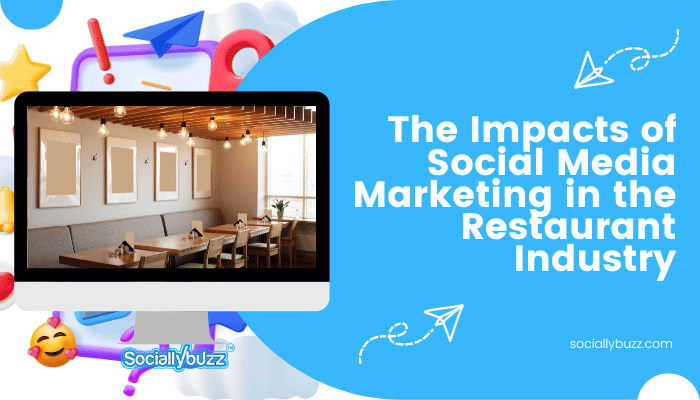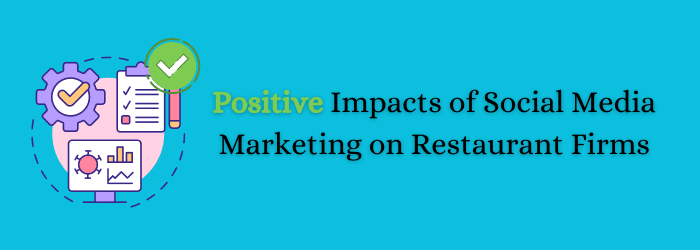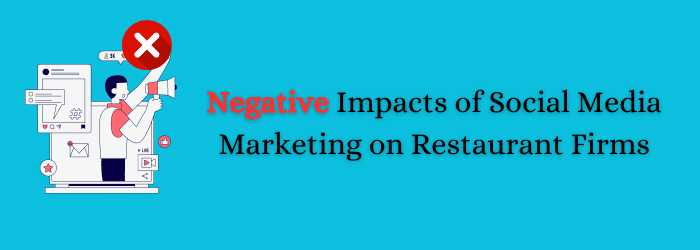
Social media marketing is an indispensable tool in the modern restaurant toolkit. Considering that social media informs the purchasing decisions of more than 80% of consumers, restaurateurs, hoteliers, and other business owners now allocate a percentage of their budget to social media advertising and other forms of marketing.
About 82% of restaurants in the US use social media as a part of their marketing strategy.
The swift evolution of culinary trends and the speed at which dining experiences can be shared online make social media marketing ideal for restaurant businesses.
However, social media marketing for restaurant businesses is a two-way street that can have a negative impact when deployed wrongly and a positive impact when used correctly.
This article covers the positive and negative impacts of social media marketing on restaurant businesses.
Sociallybuzz is a leading social media marketing, management, and digital advertising agency for small and medium-sized businesses. With over 17 years of experience as one of the first social media marketing agencies in the world, we know how to create and execute marketing campaigns that will help you grow your business. Our social media agency has created successful targeted social media campaigns that acquired our customers more leads, sales, and revenue.
Discover the best Restaurant Marketing Agency to Grow Your Food Business

Social sharing is now the norm. The habit of social sharing has helped restaurateurs reach a wider audience of customers without spending on social media advertising.
Social media, Instagram in particular, is great for visual marketing, and “foodstagramming” is becoming increasingly popular. Food photos and videos have become commonplace, with many people sharing them on Instagram.
There are more than 250 million posts on Instagram using the most popular hashtag, #Food. Instagram food marketing has no limits and uses the adage, “We eat with our eyes first,” to help restaurants showcase their menu items.
Additionally, phones with high-quality cameras are now available in the market, enabling you to better capture your food and dining experience in more realistic settings. Your food receives the deserved attention when it is visually appealing. Consider this free advertising for your restaurant.
Online reviews are no longer limited to Google My Business pages; Facebook now allows users to provide direct reviews on businesses. Its user interface includes a review option by default. If you have a Facebook profile for your restaurant, prospective customers can peruse reviews without leaving the website.
Other platforms like Instagram and TikTok allow users to post video reviews. Several food-loving influencers, for instance, make it their daily mission to try out new restaurants and then share their thoughts with their followers.
Social media is where consumers learn more about restaurants they’re interested in, and customer reviews are significant contributors to consumer purchasing decisions.
A potential customer may be encouraged to try or avoid certain meals, offers, and restaurants based on their review’s positivity, negativity, or neutrality. In fact, 94% of diners look up reviews online before deciding to eat at any restaurant.
Also, there is a strong association between a restaurant’s revenue and social media ratings; a one-star rating improvement is associated with a 5-9% rise in revenue.
The instantaneous transfer of information to users is another positive impact of social media.
Smaller brands without the means to build a website or app can swiftly share information about changes to their operating hours, staff changes, new discounts, holiday closures, recruiting opportunities, and more. Restaurants of any size need to have their business information easily accessible on social media, as some prospective customers would rather interact with you and your offerings there.
Facebook, for example, provides businesses with this option through its chatbot. Enabling this option is essential for restaurants because it gives customers access to the information they need whenever they need it. As such, prospective customers no longer need to call to receive responses to their questions.
Sharing nutritional data, ingredients, menus, and specialty menus online is a wonderful way to connect with customers searching for inspiration on their preferred social media platforms.
Discover Ways to Promote Your Restaurants
Effective social media marketing for restaurants builds brand loyalty and, in turn, offers restaurant businesses a competitive advantage.
Customer loyalty is essential in this day and age. If a customer is devoted to a brand other than yours, getting your product in front of them may be challenging, much less convincing them to purchase from you. You will have to implement reward programs that entice customers to return for more.
Your restaurant business can stand out and maintain brand interest by implementing loyalty programs. Fortunately, social media platforms let you foster customer loyalty by designing successful loyalty schemes that entice people to return to your restaurant. Loyalty programs and dining incentives can also be a terrific method to promote your business, get customer feedback, and learn more about them.
Social media marketing enhances brand advocacy in no small way. When social media marketing is executed properly, restaurants can benefit greatly from it. Satisfied customers’ positive reviews and recommendations strengthen a restaurant’s brand advocacy. Making a good first impression encourages customers to repeat visits to your restaurant.
Having a fantastic, memorable dining experience is insufficient. In addition, you must continue to foster relationships with your customers by responding to their queries on social media and providing ongoing customer support.
Having and maintaining an active social media presence comes at no cost. Also, social media marketing is straightforward. You don’t need a manual to manage your business page—just an adequate time investment and intentional effort.
Many prospective customers may check social media profiles when deciding where to eat. According to a report by Oracle Gloria Food, 72% of prospective customers use Facebook photos and comments to research restaurants before placing an order.
Social media’s level of transparency enables you to share your menu and demonstrate how your restaurant consistently serves high-quality cuisine. Since social media is free to use unless you want to run sponsored advertisements, it is far more affordable when compared with many other forms of advertising.
Despite not being a component of Google’s search algorithm, social media marketing indirectly impacts a business’s overall search ranking. It can drive customers to a restaurant’s website by increasing traffic, popularity, and authority.
For instance, you may increase website traffic by including a link to your business’ website in your Instagram bio. Similarly, you can advertise events held at your restaurant on social media.
Generally, Online searchability, or SEO, will improve for social media pages with sufficient content and traffic, leading to increased revenue.
Start small if your restaurant is new to social media. Pick one or two social media channels to concentrate on marketing your restaurant business. Platforms such as Facebook and Instagram are excellent places to start.
Customer engagement is key in the digital age. This is an excellent approach to meeting millennial and Gen Z customers where they are—an era where many would prefer to email or send an instant message rather than pick up the phone. Social media ensures you provide prompt answers to any questions they have about your offering.
Over 50 million SMEs utilize Facebook Pages to communicate with their clients. This is closely comparable to the proportion of restaurants that use social media.
Social media platforms provide direct customer interaction and allow restaurants to launch streamlined marketing campaigns. By researching customer preferences, restaurants can customize their messaging and make every connection more meaningful.
Social media helps connect with customers. It allows you to elevate your customer experience by evaluating customer satisfaction. This way, you increase customer retention and build long-term consumer loyalty.
Social media’s food culture encourages users to share photos and reviews of their dining experiences, which provides quick insights into how your customers use your product and may even point out minor adjustments you can make to enhance their experience.
Bonus tip: If you wish to build a lasting relationship with your customer base, increasing your social media activity should be your top priority.
Customer feedback and trend analysis
Real-time feedback and trend analysis can be found in abundance on social media. It gives restaurants insights into what’s working and what’s not. It offers a way to quickly respond to customer comments, address issues, and acknowledge praise.
This level of attentiveness can increase customer satisfaction. Additionally, keeping an eye on social media trends in food-related themes can spur creative menu modifications that will keep your offers current and in line with customer preferences.
Recommended: Restaurant advertising ideas and tips for food firms

Time investment is vital for digital marketing, and social media can be time-consuming. Although sharing organic content on social media is free, depending on the platform you’re using and the kind of content you want to post, generating content might cost a lot of time, money, and effort.
You may have to invest a lot of time crafting content, making graphics, and keeping up an active social media presence and a thriving online marketing campaign. Building a relationship with a customer can take several months or even longer than anticipated.
Throughout your social media marketing strategy, you may save time by using a scheduling application to post your content, setting aside particular times to work on content development, and reviewing comments and feedback.
Using unsuitable social media platforms for your restaurant business can hamper growth. Studying the market to select the right network is equally important. You should decide which social media platforms your business should be more active on. Depending on the business size, You must choose the appropriate social media platform.
For a better result, Restaurateurs should determine which social media platforms are most popular for food sharing based on the demographic that makes up their target market.
In addition to sharing images and videos of food, social media platforms can be used to build positive relationships. A lack of customer relationship management expertise could lead to a decline in business. Building relationships takes time.
Therefore, it is crucial to use appropriate and courteous language while communicating with customers and patiently answering all their questions.
Recommended: Learn How to Create Your Restaurants Social Media Marketing Strategy
Restaurant businesses on social media do not always receive positive reviews. Social media is a dominant tool for sharing all kinds of product experiences. This trend allows customers to efficiently share their opinions and reviews about a restaurant. Negative reviews can hamper your brand image and endanger your business’s reputation in the near future.
Furthermore, negative reviews are more likely to be seen and read quickly than positive reviews. Negative reviews can be harmful, but they also allow businesses to show how dedicated they are to providing excellent customer service and how eager they are to resolve customer complaints.
You can demonstrate that they value customer input and are dedicated to resolving any issues that may occur by promptly and politely responding to unfavorable reviews.
You can tackle negative reviews by responding constructively, deleting misleading comments from your social media pages as quickly as possible to prevent others from accessing them, providing convenient answers that ease customers’ predicament, apologizing to the customer, and offering a viable solution.
Negative reviews impact restaurant revenue
Negative reviews may result in a loss of revenue because they can influence a potential consumer to choose a competitor’s restaurant.
According to Oracle Gloria Food, 3 out of 4 customers check Facebook photos and comments when deciding where to eat or purchase from. Considering how many people use reviews to determine where to eat, losing one or two customers due to negative reviews can generate a ripple effect.
Similar to loss of revenue, negative reviews can impact your restaurant’s ability to acquire customers. Research shows that a company may lose up to 22% of prospective customers if it has even a few negative reviews.
Potential customers may be less inclined to purchase from a business with a lot of negative reviews and may choose to patronize a competitor with more favorable reviews.
Negative reviews can also impact customer retention. When current customers come across negative reviews, they could second-guess patronizing your business and start looking elsewhere. Negative reviews can undermine customer loyalty and decrease sales by instilling uncertainty and mistrust in existing customers.
Recommended: How to Run Facebook Ads for Restaurants
Social media marketing plays a vital role in enhancing the online visibility of your restaurant business. The impacts of social media marketing on restaurants in 2024 are enormous, from promoting online presence and SEO, increasing brand visibility, and improving customer engagement to providing cost-effective advertising options.
Do not create accounts on platforms that you’ll not be active on. Give your time and effort to platforms that you want to use regularly. Pay attention to customer feedback and respond appropriately to negative reviews.
If you need help figuring out where to begin. Start with Facebook and Instagram; they are the most common social media platforms for restaurants. You can later check out other social media platforms like Twitter or TikTok.
Read More:









Subscribe now to receive relevant social media information, tips, tricks and service updates.